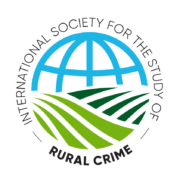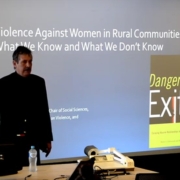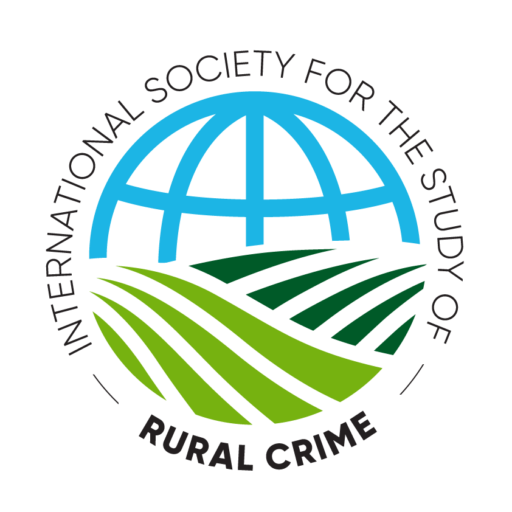ISSRC Blog
This blog provides an opportunity for pithy observations or reflections on topical rural crime news and developments, a summary of research, promotion of publications, advertisements for upcoming events… and more! If you would like to contribute, email a submission of no more than 500 words to admin@issrc.net
2021 ISSRC Rural Crime Awards Program… now open for submissions!
- Are you an early career researcher publishing in the area of rural crime and rural criminology?
- Are you a research student working on a project associated with rural crime and rural criminology?
- Are you a practitioner or working in a team doing innovative work aimed at addressing crime in rural communities?
If so, then consider applying to the International Society for the Study of Rural Crime (ISSRC) 2021 Awards Program!
ISSRC launched its Rural Crime Awards Program in 2020. The first award, the Joseph F. Donnermeyer New Scholar Award, was presented jointly in December 2020 to Kate Farhall and Willem Lombard.
We are pleased to announce the opening of the 2021 Awards Program for the following three categories:
- The Joseph F. Donnermeyer New Scholar Award
- Research Student Award
- Policy, Practice and Engagement Award
Each award recipient will receive a certificate commemorating the achievement, one year free membership of ISSRC and a £50 book voucher courtesy of Bristol University Press.
The Joseph F. Donnermeyer New Scholar Award
Download the guidelines and submission requirements for the Joseph F Donnermeyer Award 2021
- This award is given to an early career researcher for a publication pertaining to rural criminology
- Sole or multi-authored publications can be submitted but only one applicant can receive the award
- The nominee can be self-nominated, or nominated by other persons with the nominee’s permission
- The nominee can be based at a university or other higher education institution or, non-government or industry role, but they do not have to be in a position of employment
- The publication can be a journal article or book chapter accepted for publication or published (in print or online) since January 2020
- The application is to be accompanied by a nomination (not exceeding one A4 page) that provides a short career overview relevant to the nominated article in rural criminology
- Previous applicants are eligible to apply in subsequent years
- An early career researcher is defined as someone who is less than 7 years since being awarded their PhD – applicants further than 7 years out who have experienced career interruptions are eligible for the award
Please direct enquiries to Joe Donnermeyer
Research Student Award
Download the guidelines and submission requirements for the Research Student Award 2021
- This award is given to a research student (Honours / Masters / PhD student) for a sole-authored piece of writing associated with their research (unpublished or published) in rural criminology
- The applicant can be a current student or within one year of completing their degree
- The nominee can be self-nominated, or nominated by other persons, with the nominee’s permission
- Nominees should provide a PDF copy of a piece of writing (published or unpublished) related to your studies (5000 to 10,000 words) – for example, including but not limited to the theoretical or methodological framework of your work, analysis of findings and so on
- Nominees / persons nominating on a student’s behalf should include a 500 word statement outlining the contribution of the work to rural criminology as a discipline
- Previous applicants are eligible to apply in subsequent years
Please direct enquiries to Bridget Harris and Jessica Peterson
Policy, Practice and Engagement Award
Download the guidelines and submission requirements for the Practitioner Award 2021
- This award is open to practitioners who have recently undertaken innovative or significant practice and engagement pertaining to rural crime / rural crime responses
- Note: For the purpose of this award, a practitioner is an individual, group or organisation actively engaged in the innovation and/or implementation of policy aimed at addressing crime in rural communities broadly speaking
- The nominee/s can be self-nominated, or nominated by other persons with the nominee’s permission
- Nominations may focus on a specific policy initiative or aggregate efforts over-time
- Nominees/nominators should write a submission (1500 words maximum) which responds to several criteria (see guidelines), outlining the contribution of their initiative to rural criminology
- Nominees/nominators may also include additional material in their applications which evidences or contextualises the initiative(s) and impacts (i.e. outreach material, media coverage, public engagement etc
- Previous applicants are eligible to apply in subsequent years
Please direct enquiries to Kyle Mulrooney
We acknowledge the generous support of Bristol University Press in providing book vouchers for prize recipients


JOINT AWARD RECIPIENTS OF THE INAUGURAL JOSEPH F. DONNERMEYER AWARD FOR EARLY CAREER RESEARCHERS – 2020
The inaugural Joseph F. Donnermeyer Award for Early Career Researchers was presented at the Society’s Annual General Meeting in December 2020. The Awards committee was very impressed by all applicants, and ultimately selected two recipients: Kate Farhall from RMIT University in Melbourne, Australia; and Willem Lombard from the University of the Free State in South Africa.
Kate Farhall
A little bit about Kate.
 Kate is a researcher in the Centre for People, Organisation and Work at RMIT University. Her work focuses on using critical feminist analyses to address gender inequality in a range of contexts, with a particular focus on questions of sexuality and violence against women. Kate’s primary research examines how non-metropolitan experiences and geographies impact the intersection of domestic and family violence and work. Her other major projects reflect her expertise in feminist theory, regional perspectives, better work and media analysis. Recent publications include Sex, Feminism and Lesbian Desire in Women’s Magazines (Routledge) and ‘Towards an integrated theoretical framework for understanding women, work and violence in non-metropolitan contexts’ (Journal of Rural Studies).
Kate is a researcher in the Centre for People, Organisation and Work at RMIT University. Her work focuses on using critical feminist analyses to address gender inequality in a range of contexts, with a particular focus on questions of sexuality and violence against women. Kate’s primary research examines how non-metropolitan experiences and geographies impact the intersection of domestic and family violence and work. Her other major projects reflect her expertise in feminist theory, regional perspectives, better work and media analysis. Recent publications include Sex, Feminism and Lesbian Desire in Women’s Magazines (Routledge) and ‘Towards an integrated theoretical framework for understanding women, work and violence in non-metropolitan contexts’ (Journal of Rural Studies).
“I am a political scientist by training and a feminist researcher in my approach and focus. I came to rural criminology through my recent postdoctoral research, which examined the relationship between work and domestic violence outside of large cities,” Kate says.
“When I began researching in this area, I had recently completed a project looking at gendered media representations, sexuality and violence against women and was moving into a fellowship in the Centre for People, Organisation and Work at RMIT University, Australia. As I made this shift into work and employment studies, the first thing I noticed about existing scholarship examining the work–violence interface was that there were some striking oversights in the literature—most notably, that it was (and remains) incredibly urban-centric.”
Could you tell us a little about the article you wrote and the key findings?
The article of mine which has been recognised with the Joseph F. Donnermeyer New Scholar Award is designed to open up conversations about this urban focus within the literature. In particular, it seeks to provide a roadmap for future research at the domestic violence–work–non-metropolitan nexus via the development of an integrated theoretical framework for understanding women, work and violence in non-metropolitan contexts. This groundbreaking theoretical analysis was the first to bring together work, domestic violence and non-metropolitan perspectives to develop a framework for research and analysis at this nexus. Overall, the piece argues that such an integrated framework must account for the contextual factors of space and place, as well as feminist theory on work, and existing knowledge on both violence against women and the complexities of work in non-metropolitan contexts.
What motivated you to conduct research in the rural criminology space?
Feminist criminological work has been absolutely pioneering in theorising and examining violence against rural women. Similarly, rural criminology has been vital to discussions of rural life and the ways in which this is shaped by space and place. As such, engaging with the deep well of knowledge that feminist and rural criminologists have developed in our understandings of rurality, gender and violence was absolutely crucial to the theorisation I established in the paper. Indeed, any work engaging with violence against rural women would be remiss if it did not draw on feminist and rural criminological contributions. While I came to rural criminology via my interest in feminism and questions of violence against women, my work has been significantly enriched and strengthened by the wealth of knowledge rural and feminist criminologists have generated over decades of research and scholarship.
What do you plan to do next in rural criminology – what are you working on / planning to do?
Having developed a theory and an analytical approach to the non-metropolitan work–violence interface, my next step in rural criminology is to frame my empirical work through this analytical lens. I am currently working on publishing out of data collected during my postdoc, which seeks to understand the challenges and opportunities that rural life poses for workplace responses to domestic violence. In future, I hope to secure funding to extend this research so that we can better understand effective solutions to address domestic violence as a workplace issue in non-metropolitan contexts.
I want to thank all those rural criminologists who have guided me on my journey into the field, and for the ISSRC for being so welcoming and supportive of a relative newcomer. Becoming part of the rural criminology community has helped shape my work and reinforced for me the important contribution made by research into violence against rural women.
Willem Lombard
A little about Willem.
 After completing his schooling education at Harrismith High School, Willem studied B.Sc. Animal science and Agricultural Economics at the University of the Free State, South Africa. Once I obtained my degree my studies focused on agricultural economics – the field in which he obtained a PhD during 2018. Currently Willem is a lecturer at the department of agricultural economics.
After completing his schooling education at Harrismith High School, Willem studied B.Sc. Animal science and Agricultural Economics at the University of the Free State, South Africa. Once I obtained my degree my studies focused on agricultural economics – the field in which he obtained a PhD during 2018. Currently Willem is a lecturer at the department of agricultural economics.
“Rural crime, especially livestock theft, has been an area of interest for me for some time now. Being raised on a farm I have been victim to stock theft on a few occasions”, Willem says.
“While I was exploring possible subjects for my Master’s degree, I soon realised that limited research had been done in this field at that time. I was fortunate to receive project funding from RMRD SA to conduct livestock research in some of the provinces of South Africa. This article is based on the data collected during that project.”
Could you tell us a little about the article you wrote and the key findings?
This article focussed on sheep and goat theft in the KwaZulu-Natal province of South Africa where the factors influencing these thefts were analysed and the direct cost of sheep and goat theft was calculated.
Interesting results include that livestock guards were widely used in the province and many of the farmers reported that these guards were armed, with some of them guarding the livestock 24-hours per day and not just during the night. The use of other measures against stock theft was also on the rise due to the occurrence of sheep and goat theft in the province. The regular counting of sheep and goats can be recommended to farmers in KwaZulu-Natal, which was linked to lower levels of goat theft.
A comparison of livestock theft statistics revealed that official statistics under-represented actual sheep and goat thefts. Also, the recovery rates were much lower than shown in official statistics. This showed that the recovery actions of the South African Police Service and/or the livestock farmers were far less successful than what was indicated in the official statistics.
What motivated you to conduct research in the rural criminology space?
There were different contributing factors that led to this research being done. The limited research in South Africa that has been conducted in the field of livestock theft was concerning to me and therefore signalled a need for it. There were also industry role-players who suggested that research should be done in this field.
What do you plan to do next in rural criminology – what are you working on / planning to do?
Being an agricultural economist, I am always contemplating what the accurate value of an item should be. I think an article looking into the valuation of livestock stolen would add value to the field. For instance, how should the value of a stolen pregnant cow be calculated? Should we only consider what the slaughter value would have been or should we also consider her reproductive value?
Two new publications on rural violence
A new article has just been published by creative commons (and thus freely available). Written by Walter DeKeseredy, the article offers a sociological review of male-to-female sexual violence in rural communities.
Male-to-Female Sexual Violence in Rural Communities
Also new is a special issue of the journal Violence Against Women which Walter guest edited. The specal issue feature four article and two commentaries centred on “New Ways of Thinking Theoretically about Violence Against Women and Other Forms of Gender-Based Violence”.
Violence Against Women – Volume 27, Number 5, Apr 01, 2021 (sagepub.com)


